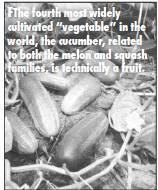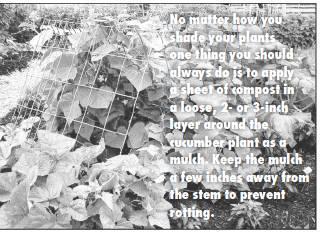Drippin’ Gardening
Are you growing cucumbers in your garden? If not, you are really missing out on one of the most nutritious and delicious things you can grow during our super-hot summer months. The humble cucumber is actually a nutritional powerhouse. Surprised? I was, but it turns out that the cucumber is a superfood containing almost all the vitamins you need each and every day, including B vitamins, vitamin C, fiber, vitamin K1, copper, potassium and manganese. Eat just one cucumber daily in place of a multivitamin. Who doesn’t love a cool, crisp cucumber plucked straight from the garden? The fourth most widely cultivated “vegetable” in the world, the cucumber, related to both the melon and squash families, is technically a fruit. With its mild, refreshing flavor that mixes so well with other garden offerings, cucumbers are actually 90% water, but still manage to provide many valuable health benefits all while being easy to grow in the backyard garden.
Like so many other plantbased foods, cucumbers originated in the Mediterranean, and were brought to the Americas by European explorers in the 1500s. Growing on a long, trailing vine, cucumbers come in two main categories: slicing cucumbers, which are generally larger and thick-skinned; and pickling cucumbers, which are smaller and thinner-skinned. An alternative is the longer, thinner English or gourmet cucumber, also known as “burpless,” with seeds so small they’re basically inconsequential.
Grown wild throughout India, cucumbers are used as a traditional medicine to treat headaches. The seeds have found a niche as a diuretic, and the juice is used as an acne cream and a soothing remedy to tired, puffy eyes. These early uses led scientists to investigate cucumber fruit, seeds, and extracts as an effective treatment in other areas of medicine.
Along with the tomato, cucumbers are my favorite garden veggie for this time of year. The blistering summer sun, with little rain, provides that challenge that shows the metal of most gardeners, but even in our central Texas summer you can still grow a wonderful cucumber. One of the best hints is remembering that water and mulch are the gardener’s (and plants) best summer friends. In the heat of our summer, the real trick to getting great cucumbers is watering. My recommendation is to water once a day in the morning, if temperatures are in the high 90s or triple digits, or every other day if temperatures are in the low 90s. Cucumbers require watering on a regular basis, so stick carefully to a regular watering schedule. Never water less then every other day unless you can feel moisture a couple of inches deep when you stick your finger in the soil, in which case you can delay watering until the soil feels a bit dry.
If the cucumber vines need a little help in grabbing the trellis, gently move the vine to sit over a rung in the trellis it will soon latch on. Before long, there will be flowers and fruit. Harvest each cucumber before it gets too fat and starts to yellow. Suyo Long Cucumber is one of the best varieties for our hot summers, or you might want to try the Lemon Cucumber that produces a round, yellow fruit filled with flavor.
For those who’ve noticed their cucumbers seem to deteriorate soon after refrigerating them, studies have found that, surprise, cucumbers maintain freshness longer when stored at room temperature. Cucumbers are also highly sensitive to ethylene, a natural plant hormone responsible for initiating the ripening process in several fruits and vegetables, so another recommendation is to store cucumbers away from bananas, melons, and tomatoes because of the natural ethylene they generate.
How to Protect Your Cucumbers in The Summer Heat:
• Cucumber plants, like most vegetables, become stressed at temperatures greater than 95 degrees for an extended period of time. The excessive heat can cause wilting, leaf drop and sunburned leaves. In some cases, the plant can stop growing completely. Some of the best ways to protect cucumber plants from excessive heat are to apply mulch to cool the soil and provide afternoon shade from direct sunlight. There are several simple and inexpensive fixes that can reduce the soil temperature by up to 10 degrees.
First off, you can hammer four stakes into place around the cucumber plants. Place a dark-colored shade cloth over the stakes, angling the cloth to allow at least two feet of air flow around the cucumber plants. If the cloth is closer to the plant, use a light-colored cloth to reflect the sun.
• Or you might place muslin or cheesecloth directly onto the cucumber plant foliage to protect it from humidity and sunlight. You can also place paper bags over the cucumbers to protect them from the sun.
• But you might try placing a garden umbrella in a strategic spot to protect the cucumber plants from direct sunlight, moving it as needed when the sun sets. You can also place a laundry basket upside-down over smaller cucumber plants.
No matter how you shade your plants one thing you should always do is to apply a sheet of compost in a loose, 2- or 3-inch layer around the cucumber plant as a mulch. Keep the mulch a few inches away from the stem to prevent rotting. If you do not want to use the compost you can apply a 4-inch layer of chopped or shredded dried leaves or straw to the soil around the cucumber plant or even apply damp sheets of newspaper to the soil around the cucumber plants. Use four to six sheets and apply them loosely. Make sure the newspaper isn’t soaked with water. Prevent the newspaper from drying out completely with a layer of straw or grass clippings over the top of it.
So now that you know how to grow them in our heat, do you want to know why I recommend this wonderful veggie so highly? It is not just because it tastes great.
• Need an energy boost? - Rather than reach for that third cup of coffee, chomp on a cucumber instead. The carbs and B vitamins in cucumber provide sustaining energy that can last for hours.
• A little too much to drink last night? - To avoid having your night out turn into a morning nightmare, try eating some cucumber. Eat a cucumber right before bed and your hangover pains will be lessened. Cucumber contains a mix of B vitamins, sugar and electrolytes that keep you hydrated and feeling great after a night out on the town.
• Been eating too many sweets? - Reduce sugar cravings by snacking on cucumber slices rather than reaching for sugary snacks. I have started keeping a little dish of sliced cucumber by my desk. With a sprinkle of sea salt and a little pepper, this snack keeps me full all day long!
• Feeling stressed? - If you are having a crazy day, boil a few slices of cucumber on the stove and breathe in the steam. The aroma of cucumber can promote feelings of calm and relieve anxiety. Want an extra boost? Add a few drops of anxiety-busting lavender essential oil into the mixture.
No matter why you to eat cucumbers isn’t it nice to know that with just a small amount of planning and effort you can grow you own healthy, organic, and non-GMO cucumbers right in your own backyard? And now you know how to keep your garden producing cucumbers all summer long - even in our August heat, no matter how high the mercury rises.






